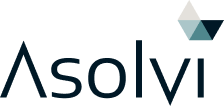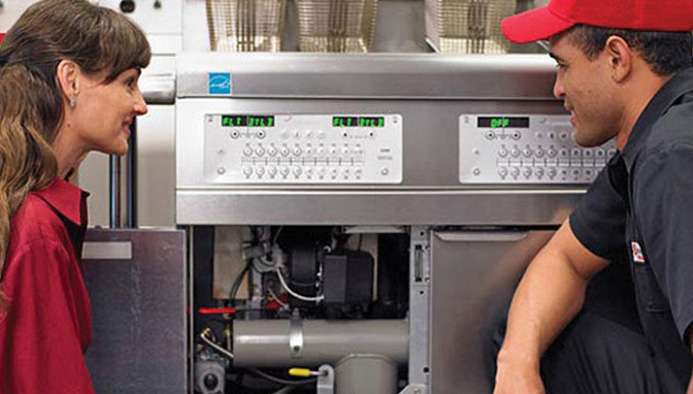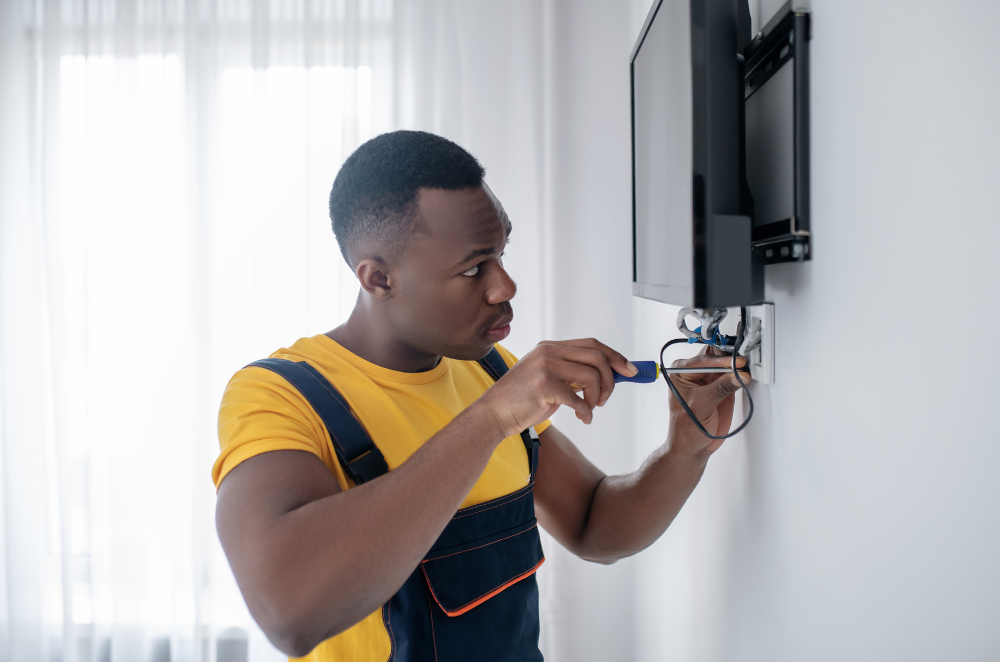Response times and first-time fix rates are at an all-time high for kitchen equipment giant Welbilt. The integration of their data and processes using field service management technology from Asolvi has eliminated copious manual and error-prone interventions. This, in turn, has enabled them to refocus their energies on more important things, like their customers and commitment to innovation.
In this case study, Operations Manager Mick Bradley reveals why Welbilt is performing better than ever.
A constant in the foodservice industry for decades, Welbilt trace their roots back to the Hirsch brothers’ Welbilt Stove Company, founded in 1929. Today they are an extended, still-growing family of twelve brands that includes Merrychef, Frymaster, Manitowoc, Delfield and Crem. They manufacture, install and maintain customised kitchen solutions to optimise space, reduce energy consumption and meet the increasingly discerning tastes and preferences of diners. Their solutions encompass almost every piece of professional kitchen equipment you could think of: speed ovens, pizza ovens, microwaves, fryers, griddles, chillers, ice machines, coffee machines, beer coolers, serving systems and more.
Welbilt implemented Asolvi’s Tesseract product in 1989. For many years they used the same version, not leveraging the benefits of Tesseract’s improving functionality and flexibility for the catering equipment market. All that changed seven years ago when Welbilt decided to upgrade to the most current version of Tesseract. The upgrade, linked with an internal systems/process review, streamlined their operations to such an extent that it’s now easier for them to grow. This is why we’re seeing the addition of more and more brands to the Welbilt family in recent times.
“Tesseract is a very flexible and adaptable system,” says Mick Bradley. “Thanks to its wide scope for integration, we’ve made some powerful efficiency gains and been able to change and grow with confidence as a result.”
Automatic Call Logging
Previously, all service calls that came in via email were logged manually by the service team. This took about three minutes per call and was a problem during peak periods when there was a particularly high call volume. Resources had to be shifted from other areas to cope with the demand.
Asolvi was able to integrate these emails with the Tesseract system using a sophisticated application programming interface (API), which allows information to be transferred electronically between Tesseract and countless third-party software products. Now, when a call comes in, Tesseract reads the email and automatically converts it to a service call. This happens 24/7 with no human intervention involved.
Mick reveals, “Around 16,500 calls a year were coming in by email and our service teams spent approximately 825 hours logging them all. So, thanks to Asolvi, 825 hours are now being saved. It also means our customers get better response times since they don’t have to wait for an email to be read and a call logged manually before someone attends to it. This is especially crucial for emails received outside of normal office hours.”
Faster Stock Management And Auditing
Welbilt used to have to freeze all van stock movements for up to three days while they audited it. This meant stopping parts going out to field engineers and, in effect, stopping them from doing any work. This was because their teams were required to handwrite parts numbers and quantities into the system, a process that was slow and prone to human error. Asolvi integrated Tesseract with Welbilt’s enterprise resource planning (ERP) system so that all stock orders could be imported directly into Tesseract using the API.
“Full integration of our ERP system with Tesseract means that stocktaking only takes three to four hours from count to reconciliation, and engineers can be back on the road the same day,” says Mick.
Day-to-day stock management is more efficient too. Mick explains, “Prior to integration, the majority of van stock management was paper-based and required a significant amount of manual intervention in order for parts consumed to be replenished.”
Tesseract has assisted in automating these processes. Now engineers raise parts requests and record parts used electronically using the mobile solution, and the API transfers the data across to the ERP system. Then, once an order has been processed, the API pulls the information back into Tesseract to say that it’s been packed and shipped.
“That’s the power of integration,” says Mick. “We have information flowing seamlessly all over the business. It’s very slick.”
A 96% First-Time Fix Rate
Scheduling is another area where Asolvi has been able to make a huge difference to Welbilt’s operational efficiency. Welbilt used to manually schedule every maintenance visit for every piece of equipment. The onus was on the service team to remember when visits were due and make evaluative decisions about which engineers were the best fit for a job.
A few years ago, Welbilt decided to drastically simplify the process using the Tesseract scheduling tool known as Diary Assist. At the touch of a button, Diary Assist automatically assigns engineers to an unlimited number of jobs in one go. It uses variables such as skill set, travel times and shift patterns to match engineers with jobs. Mick says, “Scheduling, when it was manual, used to take the best part of a day. With Diary Assist it takes an hour.”
In addition, Tesseract batch-generates preventative maintenance visits based on contractual rules and asset data, automatically inputting them into the live diary so that they can be planned and agreed in advance. Mick explains, “We have a huge volume of preventative maintenance calls and, thanks to Tesseract, we don’t miss any of them. We have a lot more control over planning than we ever used to and, as a result, our percentage of overdue calls is extremely low.”
With these efficiency gains, Welbilt have been able to improve their response times for preventative and reactive maintenance work by 20%. The company is also achieving a 96% first-time fix rate, which Mick believes is largely down to the overhauled scheduling.
Meeting Foodservice Equipment Challenges
Fast response times and high first-time fix rates are essential for manufacturers and suppliers of professional kitchen equipment, particularly those expanding their portfolio of products and services at pace, like Welbilt. According to Mick, this is what makes Asolvi a great partner for the industry.
He says, “Asolvi is particularly strong on contract management and preventative maintenance—fundamental requirements for this industry. Being able to see the full history of our customers’ equipment is essential for determining cost of ownership and cost of warranty. And then there’s the obvious point of if we don’t maintain the equipment properly, our customers can’t serve food. Asolvi helps us make sure that they can. We look forward to continuing to work with Asolvi to explore opportunities for further integration and further simplification of our business processes.”





